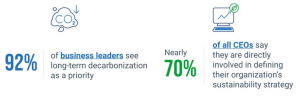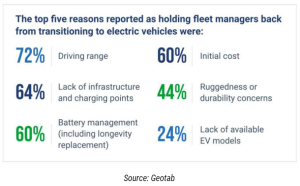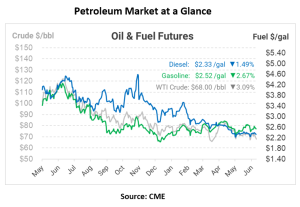
Greening the Fleet: New Study Shows Fleet Managers Embracing Sustainability Opportunities
It’s no secret that organizations of all sizes are under increasing pressure to reduce their carbon footprint and show their commitment to new sustainability opportunities. With regulations getting stricter, customers and investors demanding eco-friendly practices, and the need to address the climate crisis, companies are being pushed to take action. Transportation makes up a large portion of US emissions, so fleet owners and operators are at the forefront of these efforts.
In the race to go green, it’s clear that sustainability is a must-have for organizations. Geotab recently conducted a study to understand how organizations are progressing in their sustainability and electrification plans. The research shows that 92% of business leaders prioritize long-term decarbonization. Get this: nearly 70% of CEOs are personally involved in shaping their organization’s sustainability strategy. Staying competitive in today’s market means embracing sustainability and making it a part of fleet operations.

The research surveyed 110 fleet professionals across the United States between January and February 2023, and highlights that 69% of participants reported reduced operating costs by leveraging fleet sustainability data. In today’s article, we’ll explore the study’s findings and some important insights.
Sustainability is a big deal
The transportation sector currently accounts for 28% of greenhouse gas emissions in the United States and 15% globally, highlighting its important role in the battle against climate change. The study showed that more than half of the fleet professionals surveyed expect their customers to demand more sustainability initiatives in the next 1 to 3 years. The study also revealed that 66% of fleet professionals are planning to invest more in fleet sustainability over the next three years.
Sustainability benefits the bottom line
Going green isn’t just good for the environment; it’s good for business too. The study found that 69% of fleet professionals reported cost savings from their sustainability efforts in the past years. Additionally, 57% reported a reduction in fuel usage as a key achievement in their sustainability efforts. These findings emphasize the potential for organizations to achieve both environmental and financial goals simultaneously. It’s a win-win!
Tracking EV performance and use
Electric vehicles (EVs) are gaining popularity among fleet managers. The study showed that 54% of respondents already have EVs in their fleet or on order. However, some fleets still have reservations about transitioning to electric vehicles, citing concerns such as driving range, lack of infrastructure and charging points, battery management, initial cost, ruggedness, durability, and the availability of EV models.

Fleet Management
As businesses strive to keep up with the ever-evolving fleet landscape, the use of technology that can scale with their growing efficiency needs becomes crucial. By using data intelligence, fleet owners and operators can make smarter decisions, save money, and improve performance.
Fuel Data Management
Fuel data management provides valuable insights and allows for informed decision-making, leading to significant benefits in terms of cost savings, efficiency, and environmental sustainability.
FuelNet, Mansfield’s fuel management platform, offers operational and financial visibility to enhance fuel management. It simplifies the tracking of renewable fuel supply, as well as fuel usage by vehicle, by providing a centralized hub for controlling all fuel management aspects.
With FuelNet, fleet owners and operators can conveniently manage and monitor their activities in one place. Reach out to Mansfield today to learn more about FuelNet and how you can achieve complete visibility into your transactions and take decisive action in your fuel management program.

This article is part of Daily Market News & Insights
Tagged:
MARKET CONDITION REPORT - DISCLAIMER
The information contained herein is derived from sources believed to be reliable; however, this information is not guaranteed as to its accuracy or completeness. Furthermore, no responsibility is assumed for use of this material and no express or implied warranties or guarantees are made. This material and any view or comment expressed herein are provided for informational purposes only and should not be construed in any way as an inducement or recommendation to buy or sell products, commodity futures or options contracts.





